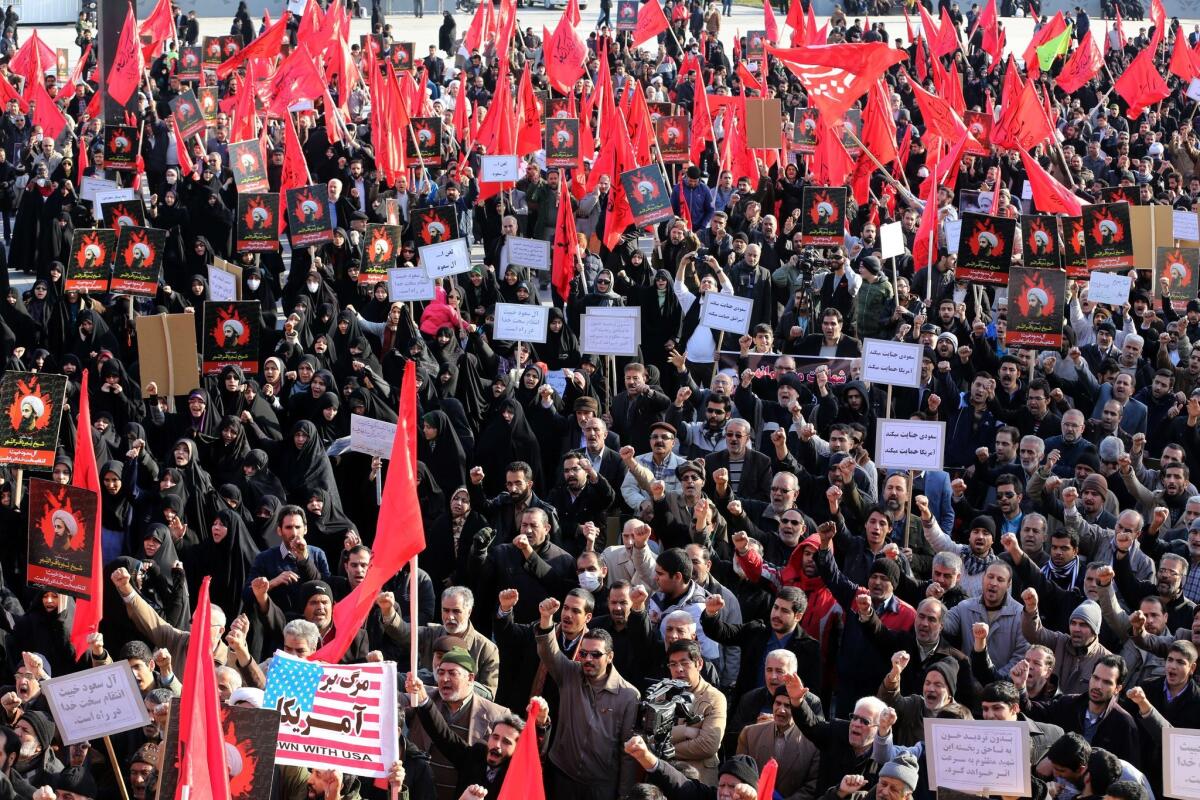Editorial: U.S. fails to condemn the inhumane execution of a Shiite Muslim cleric by Saudi Arabia

Iranians gather in Tehran during a demonstration against the execution of prominent Shiite Muslim cleric Nimr al-Nimr by Saudi authorities on Jan. 4.
- Share via
Saudi Arabia’s execution of a prominent Shiite Muslim cleric was an inhumane and provocative act that has escalated the tensions with Iran and complicated the already tenuous effort to reach a negotiated end to the Syrian civil war. It deserved — but didn’t receive — a strong condemnation from the U.S.
Sheik Nimr al-Nimr was one of 47 people executed last week on terrorism charges. Most were punished for participating in attacks by Al Qaeda on the Saudi government. But the charges against al-Nimr were more amorphous, including “inciting terrorism and sedition” and “disobeying the nation’s guardians.” (He also was convicted of attacking security personnel during his arrest, an allegation his family disputes.)
Neither anxiety about the Syrian talks nor historical ties between Washington and Riyadh justify a mealy-mouthed reaction to al-Nimr’s execution.
Although it is true that the sheik’s anti-government rhetoric was heated, he appears to have been more a political prisoner than a terrorist, and his chief crimes, as far as we know, seem to have involved dissent and criticism of the government. What’s more, his execution was certain to enrage Shiite Muslims inside and outside Saudi Arabia. That he was put to death anyway suggests that the government of King Salman, who ascended to the throne last year, was either indifferent to the consequences or determined to provoke Iran, the predominantly Shiite nation with which Saudi Arabia has been competing for regional influence.
The execution justified a strong reaction from the United States, an ally of Saudi Arabia that nevertheless has been willing to criticize the kingdom for its lamentable human rights record. In its most recent human rights report, the State Department faulted Saudi Arabia for, among other things, “holding political prisoners; denial of due process; [and] arbitrary arrest and detention.”
Yet faced with a specific case, the Obama administration offered a tepid reaction. A State Department spokesman noted that the U.S. had expressed its “concerns” to Saudi officials about their legal process and warned that al-Nimr’s execution “risks exacerbating sectarian tensions at a time when they urgently need to be reduced.” On Monday, White House Press Secretary Josh Earnest said the U.S. had raised concerns to the Saudis in advance about the consequences of executing al-Nimr.
Those consequences include the storming of the Saudi Embassy in Tehran and the retaliatory decision by Saudi Arabia to cut diplomatic ties with Iran. U.S. officials fear that another casualty will be negotiations on the future of Syria promoted by a group of nations including Saudi Arabia and Iran. Those talks, which U.S. policymakers hope would also weaken Islamic State, are supposed to take place in Geneva on Jan. 25.
It’s understandable that the administration doesn’t want to undermine the support of Saudi Arabia for the Syrian negotiations. It is also a fact that the U.S. has sought to reaffirm its support for Saudi Arabia and other Sunni-led Arab states in the aftermath of the nuclear agreement with Iran. But neither anxiety about the talks nor historical ties between Washington and Riyadh justify a mealy-mouthed reaction to al-Nimr’s execution. Not for the first time, the Obama administration failed to find its voice.
Follow the Opinion section on Twitter @latimesopinion and Facebook
More to Read
A cure for the common opinion
Get thought-provoking perspectives with our weekly newsletter.
You may occasionally receive promotional content from the Los Angeles Times.









